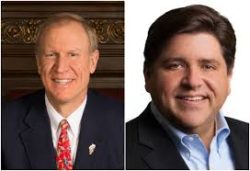Paige Hosbein Illinois’ Gubernatorial race is on track to potentially be the most expensive Governor’s race in the history of our country. In the Illinois primary election, voters must declare themselves either a Democrat or Republican before they vote, and subsequently can only chose to vote for the primary race of that political party. Once each party has chosen a candidate, they run again in the November general election. To make an athletics comparison, a team must win sectionals before advancing to the final at the State Championships. Although campaign advertisements began nearly a year ago, the primary election takes place next month on March 20th. Advertisements often only tell a single story, which can be extremely dangerous in its small scope. The majority of Latin students are not yet eligible to vote, but can still benefit immensely from learning about how the impact of candidates’ policies on Illinois residents, and our future. The projected top two candidates, based on the polls, are Republican Bruce Rauner (current Illinois governor whose wife is a former Latin board member) and Democratic J.B Pritzker (one of his children attended Latin and one still attends). Each of these candidates have donated around $50 million to their own campaigns, begging the question: can you win an election for a major political office without having your own warchest? In Illinois, if a candidate donates $250,000 or more of their personal money to their campaign, outside donors can contribute more than the normal $5,600 limit. Therefore, candidates who are unable to contribute the $250,000 to their campaign are put at a significant disadvantage because wealthy donors contributions would be limited. This year, incumbent Republican Governor Bruce Rauner has declared his intention to run for re-election to a second term in office. Ken Griffin, Illinois’ wealthiest man, donated $22.5 million to Rauner’s campaign in 2017. Rauner’s campaign focuses on property taxes, education, criminal justice and ethics. He wants to propose “property tax relief, real term limits, and budgets that won’t bankrupt Chicago” (Rauner Ad). Rauner’s Republican primary challenger is Jean Ives, an Illinois State Representative for the 42nd district and a strict conservative. Ives does not have the substantial wealth that Rauner has, but still has been able to fundraise for her campaign. Notably, Richard Uihlein, who supported Rauner in the last election, instead donated $2.5 million to Ives this year. The Democratic primary is much more crowded with six candidates vying for a spot on the Democratic ticket. The six Democratic contenders are J.B. Pritzker, Daniel Biss, Bob Daiber, Tio Hardiman, Chris Kennedy, and Robert Marshall. Pritzker is a successful venture capitalist and philanthropist. One of his most recent ads for criminal justice reform depicts a Chicago citizen who was released from jail after ten years in prison for a crime he didn’t commit; Mr. Pritzker assisted him in getting released and the thankful man said he would be proud to call Mr. Pritzker his Governor. His campaign roots in early childhood education, a proposed affordable health care called Illinois Cares, and resisting President Trump. Pritzker has outstanding name recognition, partly due to the ads he’s been running for the past nine months. Pritzker’s serious primary challengers are Chris Kennedy and Daniel Biss. Chris Kennedy, a member of the Kennedy dynasty, is a businessman and relatively political newcomer. He contributed $1.25 million to his campaign funds. Contrastingly, Daniel Biss, an Illinois member of the Senate, distinguishes himself from Pritzker and Kennedy as the middle-class progressive candidate. He prides himself on being relatable for Chicagoans because he has a more personal connection to the middle class. Most recent polls give Pritzker and Rauner leads in their respective primaries. The question remains: are these candidates ahead because of where they stand on the issues or is it their wealth that attributes to their successful campaign ads? Would the race be closer if everyone spent the same amount of money on their campaign? Recent history shows that a candidate that does not have strong financial backing will have a hard time making their name stand out on a ballot.]]>
Categories:
Money in the Gubernatorial Race
February 17, 2018

0
More to Discover

























































